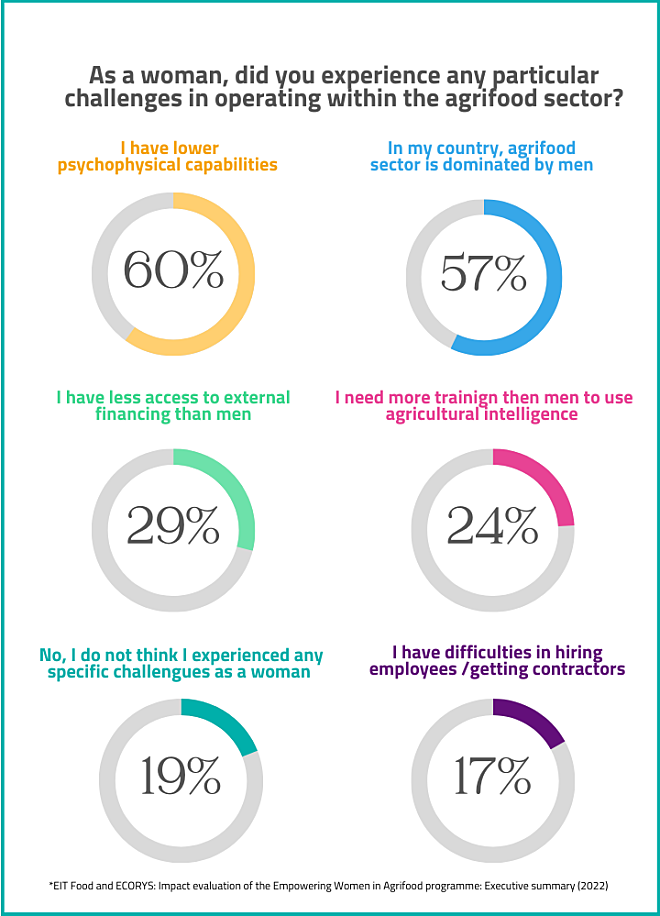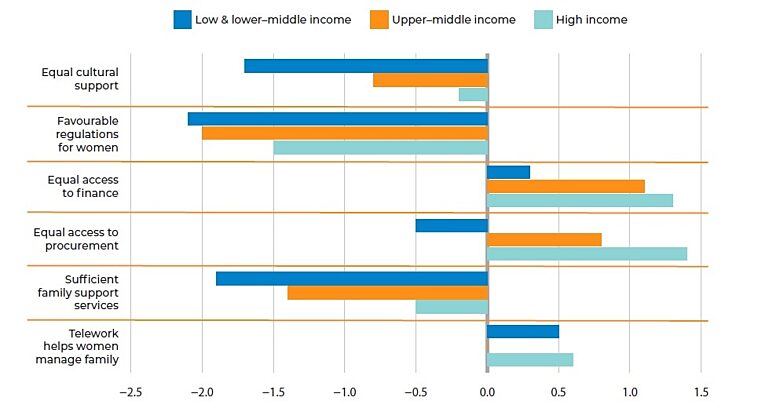
Celebrating Women's Entrepreneurship Day: Empowering Women in Agrifood
This day serves as a powerful reminder of the vital role women play in the business world. It's a moment to applaud their resilience, innovation, and unwavering dedication.
On the 19th of November, we enthusiastically joined the global celebration of Women's Entrepreneurship Day, a day dedicated to honoring and supporting women entrepreneurs around the world. Spearheaded by the Women's Entrepreneurship Day Organization (1), this day serves as a powerful reminder of the vital role women play in the business world. It's a moment to applaud their resilience, innovation, and unwavering dedication.
Entrepreneurship, fueled by the innovative spirit of individuals, stands as a foundational pillar of societal health and wealth. It acts as a formidable engine for economic growth, fostering essential innovation not only to seize new opportunities, enhance productivity, and create jobs but also to address some of society's most pressing challenges, such as the United Nations Sustainable Development Goals (SDGs). Women entrepreneurs bring a unique and invaluable perspective, enriching the landscape of entrepreneurial endeavors and contributing to a more diverse and inclusive business world.
Challenges Faced by Women in the Workforce
While we celebrate their achievements, it's crucial to reflect on the hurdles women encounter in economic activities. Globally, women's participation in paid economic endeavors still lags behind that of men. The worldwide labor force participation rate for women slightly surpasses 50%, in stark contrast to men's 80% (2). Women are less likely to engage in formal employment and frequently encounter barriers to business expansion and career advancement (2). According to the last Global Gender Gap Report, women remain outnumbered in senior leadership positions across all industries, with particularly low representation in fields like Agriculture (23.3%) (5).

Undoubtedly, entrepreneurship is one of the keys to empower more women, improve this ratio and bring more women to management roles.
But, what does a woman find when she faces entrepreneurship?
First of all, we need to talk about the entrepreneurial intention itself. Europe continues to show the lowest rates of entrepreneurial intentions and participation rates for women (3).
Women tend to be less active and make smaller related investments compared to men and experts often rate the enabling environment for women entrepreneurs poorly in many countries (3).

A survey conducted as part of the "Impact evaluation of the Empowering Women in Agrifood programme," a study by EIT Food and ECORYS (6), also offers crucial insights into the challenges faced by women in business, with a specific emphasis on the agrifood sector.
The largest number of women surveyed noted that the business sector was male-dominated (62%), with respondents highlighting concerns about their lower psychophysical capabilities, such as reduced physical strength compared to men, impacting their competitive advantage in agrifood sector (60%).
Additionally, a considerable portion expressed that they lacked the resources to develop their ventures (52%).

Furthermore, respondents revealed disparities in access to external financing, with 29% acknowledging that they have less access to such resources than their male counterparts.
These findings underscore the urgency of creating a more supportive and equitable environment for women entrepreneurs, particularly in sectors like agrifood.
What is an enabling environment for women entrepreneurs?
When we talk about an enabling environment, it is important to identify what we are discussing and what aspects determine this environment in order to improve them. The more we specify the variables and conditions that influence the success of a female entrepreneur, the easier it is to target them and create policies that enhance these variables.
Every year, GEM takes into account 6 conditions. 6 specific questions are posed to experts in the field, asking them to categorize as true or false on a scale ranging from -5 (completely false) to +5 (completely true).
- In my country, the national culture encourages women as equally as men to become self-employed or start a new business.
- In my country, regulations for entrepreneurs are so favourable that women prefer becoming an entrepreneur instead of becoming an employee.
- In my country, access to financing is equally granted for male and female entrepreneurs.
- In my country, market and public procurement are equally accessible for male and female entrepreneurs.
- In my country, there are sufficient affordable support services (i.e. childcare, home services, after-school programs, eldercare . . .) so that women can continue to run their businesses even after they have started a family.
- In my country, as a result of the pandemic, the increase in teleworking has improved work–life balance for women.
As shown in this figure, the responses to these statements were overwhelmingly negative, with no response scoring higher than 1.5.

Closing the Gender Gap: EWA's Impact
In the current landscape, initiatives like EWA - Empowering Women in Agrifood have emerged as indispensable pillars in championing women's entrepreneurship, particularly in sectors traditionally dominated by men such as agriculture and foodtech.
This 6-month entrepreneurial programme offers training, mentoring, business coaching, and networking opportunities for women entrepreneurs in the agrifood sector. In its 4th edition, it has been implemented in 11 countries in RIS areas.
These comprehensive programmes, which offer a blend of financial opportunities, networking and targeted business training, play a pivotal role in shattering gender barriers within the entrepreneurial realm.
Research has showcased that such holistic approaches, bridging the financial gap and nurturing business acumen, yield greater success in women's business ventures compared to standalone financial support or business training programmes (4).
EWA has been in operation for three years and there is already some evidence of its impact so far (2020-2022) (6):
- At least 240 female agrifood entrepreneurs took part in the programme, obtaining mentoring, training and networking opportunities;
- At least 48 female entrepreneurs have or will obtain the funding from EWA prize during the pitching competition, with almost 400.000 EUR granted in total;
- At least 40 agrifood start-ups have scaled-up on their number of clients, employees or financial turnover;
- At least 20 new agrifood enterprises have been registered within next 3 years after programme participation;
- EWA alumni/start-ups have attracted more than 12M EUR.
EWA, implemented by reputable organizations deeply entrenched in the agrifood sectors of their respective countries, stands as a transformative initiative. This strategic deployment brings forth a wealth of local knowledge, networks, and an acute understanding of the unique challenges and opportunities within each nation's agricultural landscape. The organizations' longstanding presence in their respective sectors not only enhances the effectiveness of EWA but also ensures a tailored approach that resonates with the specific needs of each community.
Through the lens of these seasoned organizations, EWA becomes not just a programme but a dynamic force driving positive change in local agrifood ecosystems.
To gain a deeper insight into the impact of EWA in specific regions, we reached out to Vanessa Archonditou, AWomanCanBe.org Founder and a key figure in the implementation of EWA in Greece. Here are her thoughts on the programme's contributions:
1. Could you share some success stories or key achievements from EWA programme in Greece?
It is the first year that our organization is implementing the EWA programme in Greece and it is early to talk about success stories. However we are very proud about the progress of our EWA2023 cohort. During these 6 months we witnessed the passion of all participants and the bonds that they created, not only the mentees with their mentors but also between the entire team. We celebrated one of our mentees giving birth, never missing a meeting or training. We really enjoyed vivid conversations on concerns and entrepreneurship challenges that lead to solutions and next steps. But one of our key achievements, is that we engaged women from all over Greece. We have mentees and mentors not only from Athens and Thessalonica (the big cities of Greece) but also from Thrace, Central Greece and the Peloponnese.
2. In your opinion, how does the EWA programme contribute to empowering women in the agrifood sector, especially considering the specific challenges they may face?
In Greece the percentage of women leaders in the agrifood sector is very low. And this is not because they lack education or will, but it is a matter of tradition. To break this tradition, women do not only need funding opportunities or education but mainly they need mentoring, coaching and support that will enable them to tackle stereotypes and build confidence. EWA is aiming to create a network of women from all over Europe that can support each other but can also learn from each other. I believe that this is the most important contribution of the EWA program, a female community in the agrifood sector that will empower them by example.
3. From your perspective, what sets EWA apart in terms of its impact on the local agrifood ecosystem in Greece?
In Greece there are several programs aiming to support and transform the food system. Many of these programs are promoting innovation and create opportunities for employment and entrepreneurship. But EWA is the only program that is focusing on women, giving them the chance to take the lead in entrepreneurship and innovation. EWA does not only contribute to the local agrifood ecosystem as a program but also as an “idea”. It is planting the seed that women are wanted and needed as leaders in the sector.
4. How do you envision the future of women's entrepreneurship in the agrifood sector?
The future of women's entrepreneurship in the agrifood sector holds great potential for positive developments. I believe that the technological advancements in agrifood, combined with the support programs and the fact that societal attitudes towards gender roles are changing , will enable women to play a pivotal role in shaping the future of agriculture and food production. In Greece this may take more time, but if we continue to empower women and create role models, we will eventually reach a point where gender will not determine their participation and success in the sector.
Is there any good news?
Amidst the challenges that women entrepreneurs face in the business world, there is a glimmer of good news. Consistent findings from the Global Entrepreneurship Monitor (GEM) data reveal that women tend to report lower rates of entrepreneurial exit than their male counterparts. This resilience is a testament to their determination and unwavering spirit.
Furthermore, initiatives like Empowering Women in Agrifood (EWA) are making a significant impact in the entrepreneurial landscape. EWA has been a guiding light for over 260 female entrepreneurs between 2020-2022, offering crucial support, mentoring, and top-notch training.
EWA's networking events, which have exceeded 25, have successfully connected startups, solopreneurs, corporates, investors, and the broader agrifood ecosystem, fostering new partnerships and opportunities.
In addition to these anticipated results, the programme has yielded additional unintended positive effects, including:
- Sense of community – during the programme, the participants have established personal ties with each other, as well as with partner organisation teams.
- New business collaborations were developed between the participants, or participants and mentors.
Moreover, the programme activities and events led to increased interest in the programme itself – but also provided platform for promotion of external initiatives during programme events.
Conclusion: Empowering Women, Empowering Society
As we mark Women's Entrepreneurship Day and reflect on the incredible journey of women entrepreneurs, we find hope and inspiration in their resilience, innovation, and dedication. The challenges they face are undeniable, but the triumphs are even more remarkable. The story of women in entrepreneurship is not just one of individual success; it's a story of collective empowerment, societal progress, and economic growth.
While we celebrate the progress and success of women in entrepreneurship, it's essential to acknowledge the challenges that still lie ahead. The road to gender equality in the business world is not without its obstacles. Bridging the gender gap in entrepreneurship and agriculture remains a complex task, demanding continued efforts in policy reform, access to finance, mentorship, and the removal of systemic barriers.
Initiatives like Empowering Women in Agrifood (EWA) stand as beacons of change, paving the way for a more inclusive and prosperous future. By providing a platform for networking, mentoring, and financial support, it has elevated the status of women in entrepreneurship. EWA's success is a testament to the fact that when we empower women, we empower society as a whole. The journey may be challenging, but the destination is a world where women entrepreneurs lead the way to a brighter and more inclusive future.
As we look to the future, it is our collective responsibility to ensure that the path to entrepreneurship is free from gender-based hurdles and that women are equipped with the tools and opportunities they deserve.
References
- Women's Entrepreneurship Day Organization: Women’s Entrepreneurship Day
- World Bank: Female labor force participation (2022)
- Global Entrepreneurship Monitor: GEM 2021/22 Women’s Entrepreneurship Report
- International Labour Organization: Effectiveness Of Entrepreneurship Development Interventions for women entrepreneurs: An ILO-WED Issue Brief (2014)
- World Economic Forum: Global Gender Gap Report 2023
- EIT Food and ECORYS: Impact evaluation of the Empowering Women in Agrifood programme: Executive summary (2022)
- AWomanCanBe.org
More blog posts by EIT Food South








